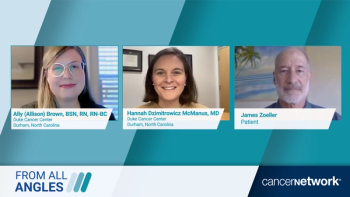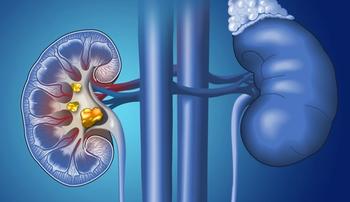Patient-Centered Care and Treatment Innovation in Renal Cell Carcinoma

Panelists discuss advanced renal cell carcinoma (RCC), including its epidemiology, typical disease presentation, and the common patient profile in terms of age, gender, and family history, while also addressing the risk stratification for advanced RCC, highlighting the differences between favorable and poor/intermediate risk categories.

Panelists discuss a patient’s treatment journey and medical history, exploring their experience with being diagnosed with clear cell renal cell carcinoma (RCC), including the symptoms at the time of diagnosis, how this rare subtype was explained by the care team, and the tests—such as imaging and blood work—that were performed prior to diagnosis and their outcomes.

Panelists discuss the multidisciplinary team’'s role in supporting patients through a renal cell carcinoma n( RCC) diagnosis, addressing informational gaps as patients process their diagnosis, offering supportive strategies and resources, and highlighting the unique challenges faced by patients with clear cell RCC compared to with those with non–-clear cell RCC.

Panelists discuss the broader treatment landscape for advanced clear cell renal cell carcinoma (RCC), outlining the current standards of care, how treatment approaches vary for aggressive versus benign or indolent tumors, and the approach to shared decision-making with patients, including counseling and educating them on different treatment options.

Panelists discuss the process of selecting a treatment plan, including how shared decision-making was approached, the key factors considered in treatment options, how patients can advocate for their preferences, and the process of recommending pembrolizumab plus lenvatinib based on clinical presentation, with a discussion of other regimens that were considered.

Panelists discuss the evolving treatment landscape in advanced renal cell carcinoma (RCC), highlighting recent notable trials and additional key developments in the field.

Panelists discuss essential patient education when initiating combination regimens for RCC, addressing overlapping and unique toxicity considerations in IO/TKI combinations, counseling strategies for monitoring and communicating potential adverse events (AEs), key AEs for patients to watch for, and strategies for proactive toxicity mitigation and management.

Panelists discuss the treatment landscape in non–clear cell RCC, highlighting how treatment approaches differ from clear cell RCC, relevant data from frontline settings, and emerging trials of note in this subset of patients.

Panelists discuss their institution’s multidisciplinary approach to RCC care, emphasizing key specialties involved in coordinating patient care, ensuring seamless collaboration and communication across the team, the value of a multidisciplinary care team from the patient perspective, and unmet needs or opportunities to enhance supportive care and quality of life for patients with RCC, including gaps in education and practical ways nurses can empower and support patients.

Panelists discuss areas for improvement in the RCC journey from the patient perspective, including the impact of emerging research on their experience, and explore therapeutic approaches and clinical research areas that show promise for improving outcomes in advanced RCC, with a focus on novel targets and mechanisms of action in development.

James Zoeller discussed various aspects of his cancer care after a RCC diagnosis with Hannah D. McManus, MD, and Allison Brown, BSN, RN, RN-BC.




